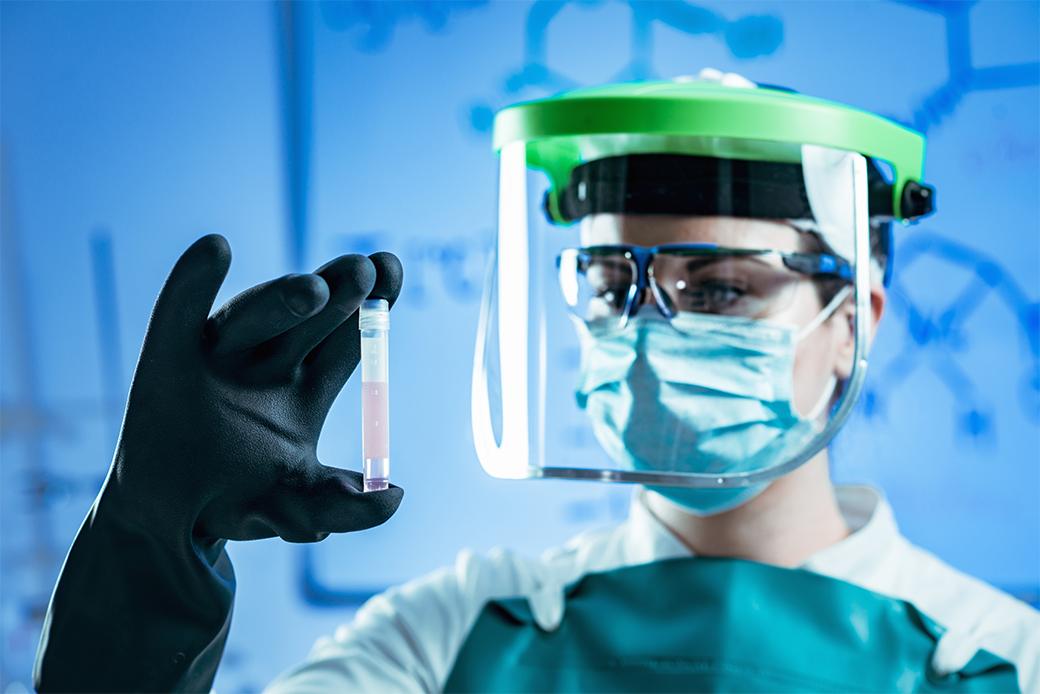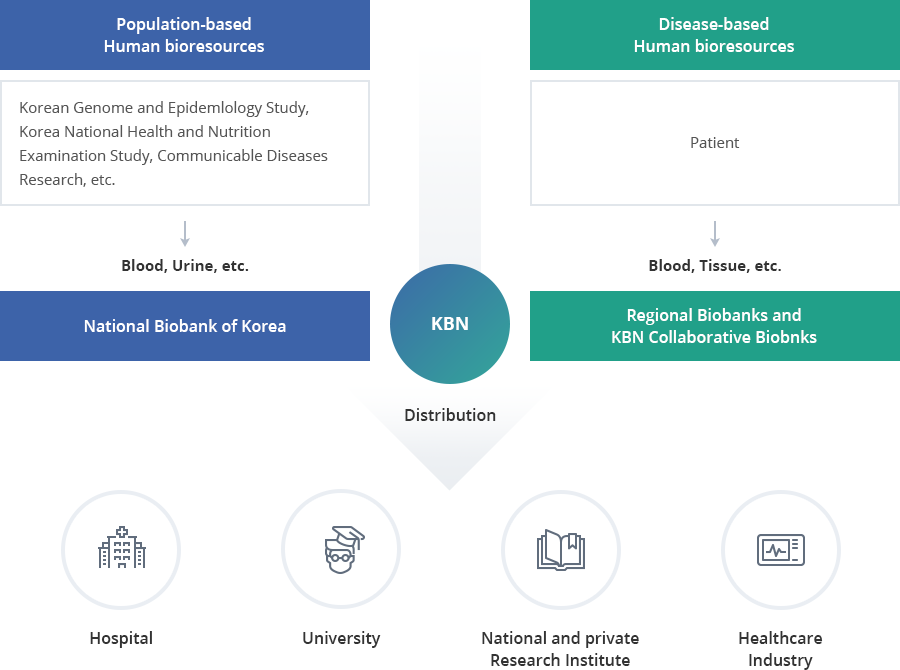contents area
Korea Biobank Project(KBP)
detail content area

Korea Biobank Project
(KBP)
Background
- “Human Bioresources” the key to the success in future precision medicine
Entering the post-genomic era, genomic analysis techniques are rapidly advancing. As a result, precision medicine of the 21st century is practice differently depending on the race and individual. We can now predict diseases and establish their causes at the molecular level by analyzing genes that lead to diseases. The whole world knows that the keys to the success in precision medicine are human bioresources and biobanks. Competition to secure human bioresources has been intensifying in the healthcare industry of the 21st century“Human Bioresources” refer to human blood, tissues, cells, body fluids, and their subsets and derivatives, which include serum, plasma, DNA (excluding stem cells, also applying henceforth), genomic data obtained through their analyses, as well as associated clinical and epidemiological data.
“Biobank” is an organization that collects and manages human bioresources and distributes them to researchers. - An efficient management system is required to secure and utilize human bioresources
With rapidly developing analysis techniques and large-scale research, an efficient system to secure and supply human biological resources has become necessary. Additionally, the Bioethics and Safety Act (2004) and the Act on the Acquisition, Management, and Utilization of Bio-Resources for Research (2009) were enacted to promote ethical considerations and facilitate research outcomes. It has thus become necessary to secure a high quality human bioresources management system.
Overview
The Korea Biobank Project, a key project of the Division of Biobank for Health Science(National Biobank of Korea), supports Korea’s healthcare R&D. The National Biobank of Korea collects and manages human bioresources for use in future healthcare and medicine research, and distributes them to researchers.
In order to secure human bioresources, the National Biobank of Korea, 17 regional biobanks in colleges, and two KBN-collaborative hospitals have been operating the Korea Biobank Network since 2008.
Operation of Korea Biobank Network(KBN)

Population-based Human bioresources
Korean Genome and Epidemlology Study, Korea National Health and Nutrition Examination Study, Communicable Diseases Research, etc.Next
Blood, Urine, etc.
National Biobank of KoreaDisease-based Human bioresources
PatientNext
Blood, Tissue, etc.
Regional Biobanks and KBN Collaborative Biobnks KBN Distribution- Hospital
- University
- National and private Research Institute
- Healthcare Industry
The Korea Biobank Network has colloected human bioresources from 852,769 people and distributed them to 2,706 research projects. As a result, a total 1,062 academic papers have been published.(As of the end of December 2018)
Distribution of human bioresources
- The Korea Biobank Network operates the “Distribution Desk of the Korea Biobank Network” in the Integrated Disease & Health Management System (is.kdca.go.kr) for the convenience of researchers and for easy access to human bioresources.
- Visit the website (http://koreabiobank.re.kr) to access the Distribution Desk of the Korea Biobank Network.
* Currently available in Korean - Via the Distribution Desk of the Korea Biobank Network, researchers can search and request human bioresourcs from National Biobank of Korea and 17 regional biobanks.
Eligible organization (in Korea) |
A research project that is conducted for public interest, funded as a national development intiative and conducted by national organizations, government-funded institutions, and/or private research centers may gain distribution access to human biospecimens * Currently Korean researchers living in Korea can apply for human bioresource distribution. |
|---|---|
Required documents |
Distribution application, written pledge, reserch plan, assessment by the Institutional Review Board, and other related documents |
Types of human bioresources to be provided |
National Biobank of Korea (NBK) : DNA, LCL, LCL-DNA, Serum, Plasma Regional Biobank : Serum, Plasma, Buffy coat, Tissue, etc. The types of human biospecimens available for distribution my differ according to the disease from which they are collected. |
Costs for human bioresource distribution |
The National Biobank of Korea Provides distribution free of charge, while, in accordance with the Bioethics and Safety Acct, the 17 Regional Biobanks may request costs to cover preservation and provision of human bioresources. |
Procedure for human bioresource distribution |

ResearcherDistribution Desk of the Korea Biobank Network
Biobank
ResearcherRegional of research result Experlment and research |
